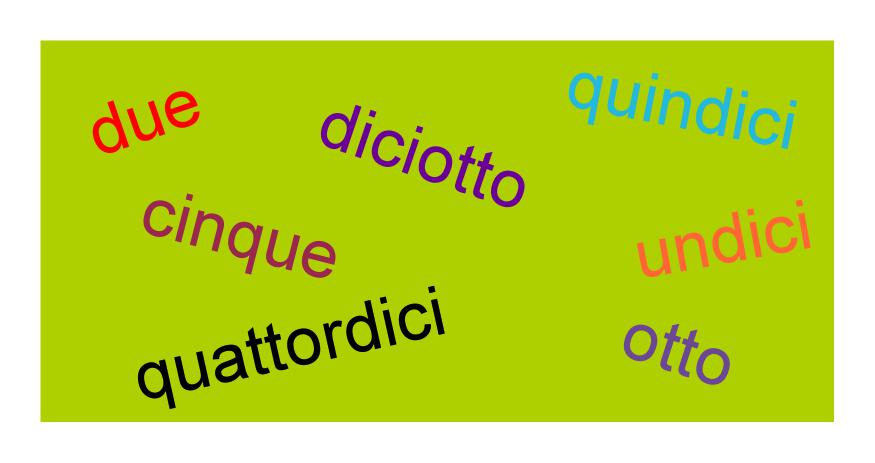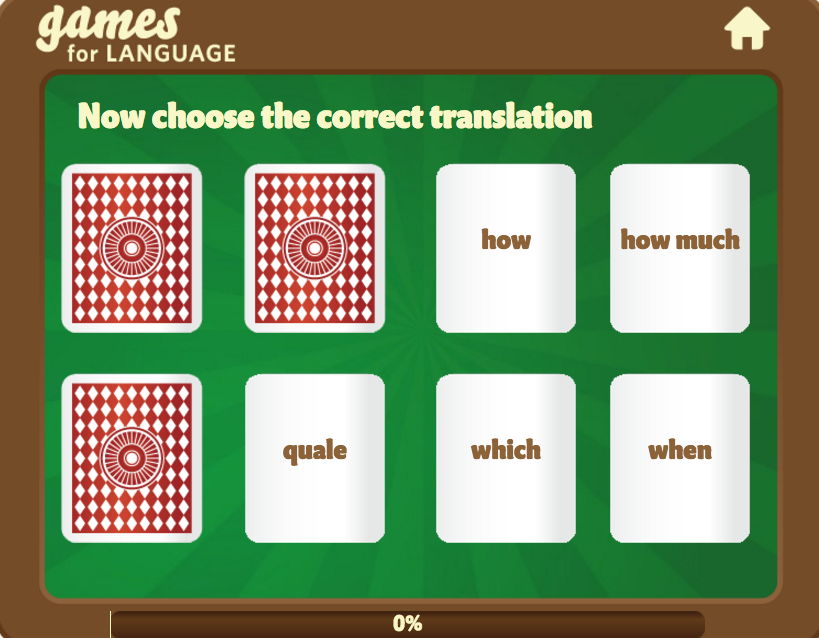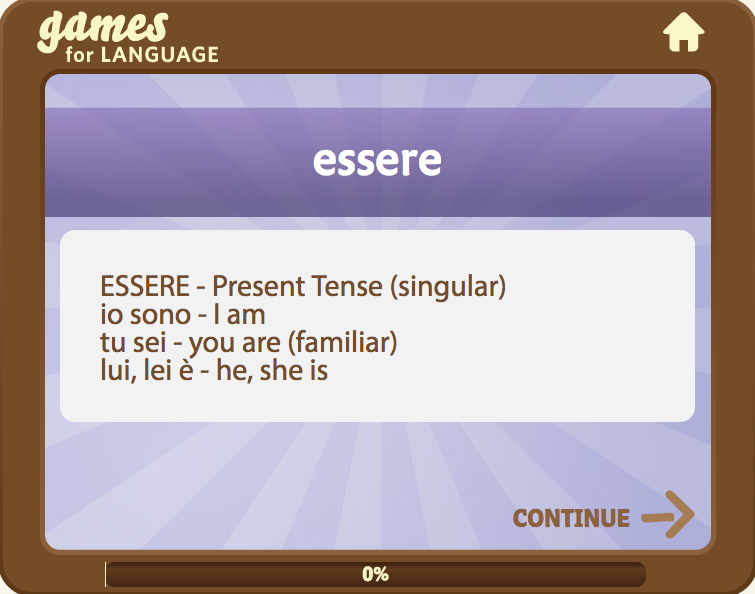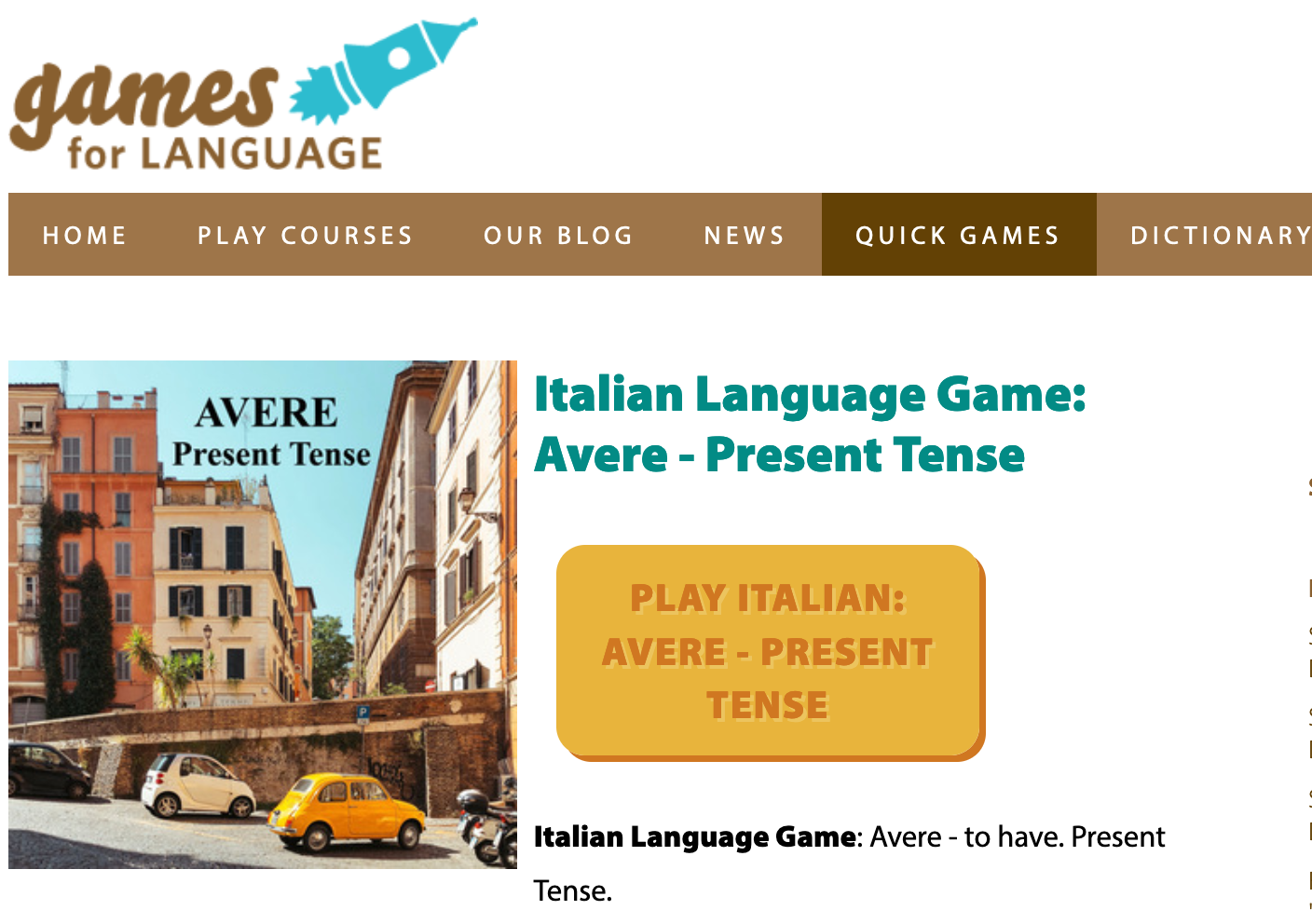5 Easy Italian Language Games
 Here's a fun way to learn some Italian words and phrases with 5 easy Italian language games.
Here's a fun way to learn some Italian words and phrases with 5 easy Italian language games.
Italian is such a beautiful, melodious language, and learning some basic vocabulary and pronunciation is not that hard at all.
Try a couple of these easy Italian games. You'll become familiar with some typical Italian words and sounds, and you may well end up falling in love with the Italian language.
A good place to start are a few common greetings and expressions. Even if that's all you know, it's a great way to engage with Italian speakers, and locals if you're traveling in Italy.
When you play the game, imitate the pronunciation of the speaker - out loud. It's all about "mouth mechanics".
Just thinking the words in Italian won't make you them sound them out right in Italian.
 1. Hello, Goodbye, etc.
1. Hello, Goodbye, etc.
Greetings and polite phrases should definitely be in your language kit.
They signal respect and friendliness.
Click on Italian Language Game: Hello, Goodbye, etc., to learn and practice these essential words and phrases.
They'll become automatic in no time, you'll see.
Being able to say them "like a native" will definitely boost your confidence when in you're in an Italian setting.
Here's what you'll learn in Game 1:
• Ciao - Hi
• Buongiorno - Good morning
• Benvenuto - Welcome
• Per favore - Please
• Grazie - Thanks
• Prego - You're welcome
• Bene - Okay
• Mi scusi - Excuse me
• Arrivederci - Goodbye
 2. Italian Numbers 1-20
2. Italian Numbers 1-20
Italian Numbers 1-20 are a good next step.
Not only do numbers contain typical Italian sounds, they are really easy to practice even when you're doing something else.
Count steps when you walk, count pushups or weight reps when you exercise, count when you're cutting your veggies, the list can go on.
Click on Uno-Due-Tre: Italian Numbers You can Learn, where you'll find Language Games for Italian Numbers 1-20, as well as another game for Italian Numbers 21 and beyond.
This is what you'll learn in Game 2:
• 1 uno
• 2 due
• 3 tre
• etc.
 3. Italian Question Words
3. Italian Question Words
Question Words are the language tools you need for getting information, even if your Italian is limited.
You'll use them for shopping, finding your way, getting together with others, learning what a word means, fixing the time when meeting someone, etc.
Click on Italian Language Game: 8 Question Words.
They are easy to pronounce, but to keep them apart you'll need a little practice. Give them a try!
Here's what you'll learn in Game 3:
• quando - when
• quale - which
• quanto - how much
• come - how
• dove - where
• chi - who
• perché - why
• che cosa - what
(With Italian 2 for Travel on our - also completely free - sister site, Lingo-Late.com, you can learn and practice 12 questions with “Mi scusi, dov'è...? [Excuse me, where is...? ] - quite useful when traveling and looking for directions.)
 4. Present Tense of "essere" - to be
4. Present Tense of "essere" - to be
As a next step, you may want to learn the present tense forms of the irregular verb "essere" - to be.
Note that in Italian, personal pronouns (I, you, he, she etc.) are often left out unless they are needed for context or clarity.
We include them at first in the game, then drop them in some of the easy practice sentences.
Click on the Italian Language Game: Essere - Present Tense.
Here's what you'll learn in Game 4:
• io sono - I am
• tu sei - you are (familiar)
• lui/lei è - he/she is
• noi siamo - we are
• siete - you are (plural)
• loro sono - they are
Passato prossimo with the present tense forms of "essere":
Note that the present tense forms of "essere" are also used to form the "passato prossimo", the Italian tense you use to talk about past events and actions that are finished.
"Essere" as an auxiliary verb is used mainly with verbs of motion, those expressing change, or verbs that are intransitive.
Examples: lui è arrivato (he arrived, he has arrived); noi siamo andati (we went).
 5. Present Tense of "avere" - to have
5. Present Tense of "avere" - to have
Finally, here's a game to learn and practice the present tense of "avere" - to have. Again, the personal pronouns are included at first and then dropped in a couple of the easy practice sentences.
Click on the Italian Language Game: Avere - Present Tense.
Here's what you'll learn in Game 5:
• io ho - I have
• tu hai - you have (familiar)
• lui/lei ha - he/she has
• noi abbiamo - we have
• voi avete - you(pl) have
• loro hanno - they have
Passato prossimo with the present tense forms of "avere":
Note that the present tense forms of "avere" are also used to form the "passato prossimo", the Italian tense you use to talk about completed past events and actions.
"Avere" as an auxiliary verb is used with most verbs (besides movement verbs, verbs expressing change, and intransitive verbs).
Examples: io ho mangiato. (I ate, I've eaten); noi abbiamo comprato (we bought, we've bought).
A few easy language games, even if they're fun, won't make you fluent. But they're a start.
And if they've put you on the language learning road, it's a good thing.
Learning new skills, discovering new places, making new, international friends, is an exciting part of being alive, right?
If our games are not enough and you want to improve your Italian further we can recommend the following sites:
1. Think in Italian. Our post: Think in Italian - Updated Review gives you some insight into how the program works. This is a Partner site and we earn a small fee (at no additional cost to you) if you subscribe after the free trial.
2. Italiano ON-air. We just added this site to our Resource page. The podcasts are currently free and you can greatly improve your Italian listening skills, if you are far enough along.
